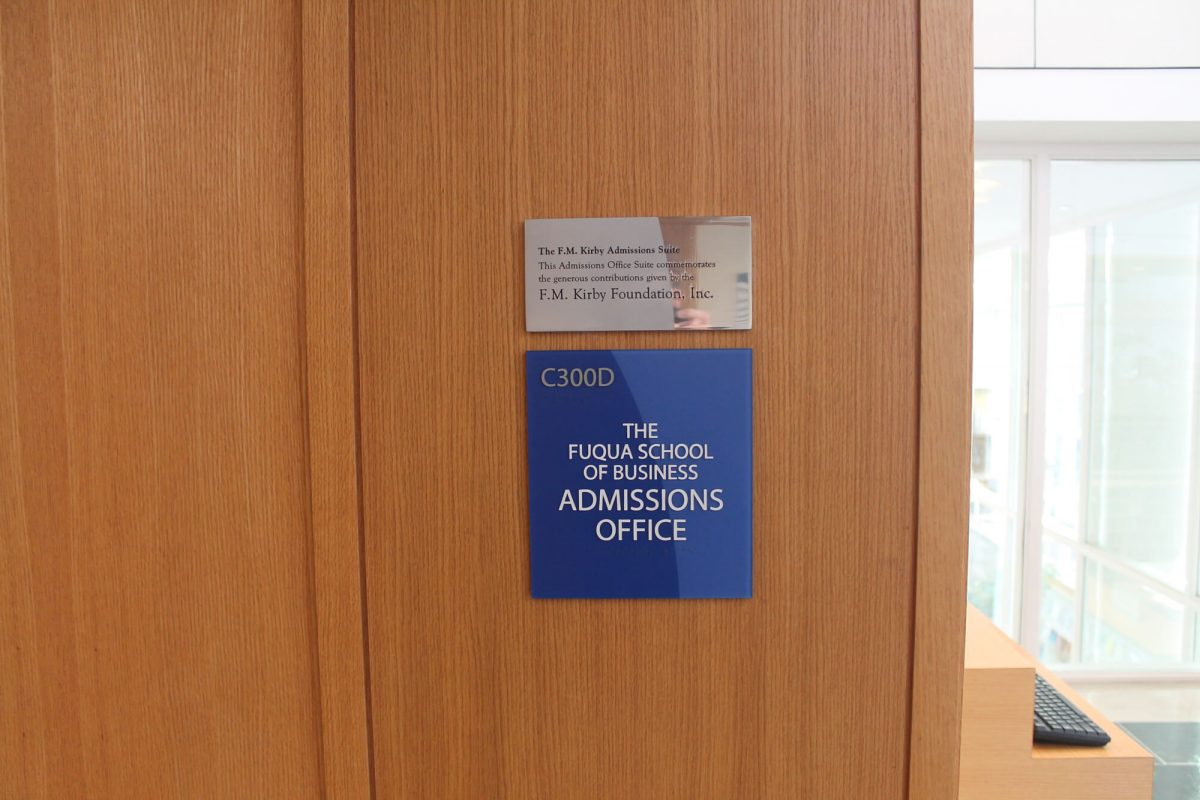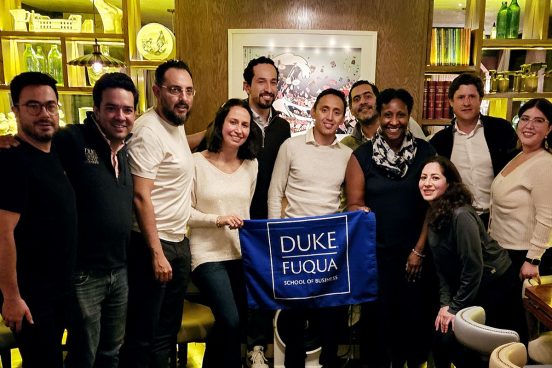Duke Daytime MBA Student Blog

Shedding Light on the MBA Admissions Process

If I met you out on the road or at one of our campus events, you’re likely to have heard me talk about the “black box” of Admissions. Applications go into the box, and decisions come out. What happens in the middle is unclear to anyone outside of the Admissions Committee. It causes much trepidation on behalf of the applicant — you may wonder, what is Fuqua looking for, and why are they asking me that?
At Fuqua, we do everything we can to demystify the admissions process. We want to help our applicants to understand what we are seeking so that you can first determine whether or not our programs are the best fit for you, and then you can put your best foot forward for the application. So let’s break down the application to provide some insight into not just what, but why we ask for what we do.
Academic Readiness
We utilize your GMAT or GRE scores, academic record, and work experience relevant to our coursework to answer one fundamental question — Will you be successful in our classrooms? The pace of the MBA program is incredibly fast. I know — I went through the Daytime MBA program, and we covered the material from my semester-long undergraduate accounting course in the first two classes at Fuqua! When you are balancing rigorous courses with your career search, leading clubs and activities, and your personal commitments, you simply must have the intellectual horsepower and quantitative aptitude to be successful. We do not want you to study 24-7. We want you to network, pursue your career and personal passions, and grow into a stronger leader and team player. If your academic background and tests are not a strong reflection of your academic aptitude, I encourage you to consider taking additional course(s) such as statistics, finance, and accounting, as success in them will demonstrate your aptitude as well as build a stronger foundation for your coursework at Fuqua.
Work Experience
We assess your work experience to answer two questions: Will your classmates learn from you? Will your past experience + our program translate well into your future aspirations? The learning in the classroom is not gained simply from the professor sharing his or her knowledge, but rather the students share their personal experiences and insights. Every class involves discussion and team assignments during which classmates share their best practices and ask thought-provoking questions. So, from an admissions perspective, we assess the quality of your previous professional experiences, including how you progressed compared to your peer group, whether you have team and leadership experiences to draw upon, if you’ve been exposed to diverse industries/functions/geographies, and whether you had the opportunity to dive deep into specific fields. Both depth and breadth are valued, and in choosing the cohort for the program, we ultimately aim to build a microcosm of the world in our classrooms through the experiences and perspectives of our students. Your resume will be our roadmap to your professional experience, so be certain that it is understandable to those outside of your industry, is impact-focused, and allocates space to the experiences that you value most.
Recommendations
How does an unbiased third party assess your performance as compared to your peers? Your two professional recommendations provide the Admissions Committee with the opportunity to understand your performance and contributions in a professional environment, through the voice of those who have worked with you closely (either in a professional setting or in community activities) and who have insight into your strengths and development areas. For your recommendations, it’s important to choose someone who knows you well, rather than someone with a big title. Preferably, recommendations can be from a supervisor or senior colleague who will take the time to provide a detailed, thoughtful recommendation with specific examples. Prepare your recommenders so that they understand why you are applying to Fuqua, and how their recommendation can highlight specific aspects of your experience and personality that are not contained elsewhere in your application. DO NOT ghost write your recommendations. DO give your recommenders plenty of time and thank them for their support. If you are unable to ask your current supervisor for a recommendation because they do not know of your business school plans, simply explain this in the optional application essay.
Leadership & Involvement
At Fuqua, a notable portion of your learning and development will happen outside of the formal classroom setting. We want to know — Will you be engaged in the community, share and pursue your passions, and make an impact at Fuqua and in the places where you live and work in the future? Your past activities and involvement — the things that you chose to do, rather than what was required for work or school, are the best indication of your potential future impact as a Leader of Consequence. Take the time to complete the leadership and involvement section of the online application, and in your essays share your passions and how you have committed yourself to them. Also be certain to mention your future aspirations about making an impact.
Essays
The essays are where you truly come alive, and where you have the opportunity to weave your application together into your personal story. Who are you as a 3-dimensional person? What are your passions and aspirations? If there are gaps in your resume or potential areas of confusion, have they been addressed? We really get to know you through your essays, and we were proud to be voted last year as the school who knew its applicants best (survey conducted by Huron Education). We LOVED the 25 random things essay that we incorporated last year as it truly provides applicants with the opportunity to share a wide range of interests and insight into who they really are, and we are excited to continue with this essay. (Check out the blog I wrote last year about the 25 random things essay.) Please, be genuine and passionate in your response to this essay — take ownership for your accomplishments and blemishes, and aim to provide the Admissions Committee with a holistic understanding of you, what has made you who you are, and what you hope to be.
Interview
Will others want to be on your team? Will you impress our recruiters and faculty? Will you make us proud as an alumnus/a? Why is the Daytime MBA program, with its incredibly cohesive and collaborative community and its focus on empowering our students to lead and make an impact at the school and beyond the right program for you? These are the key questions that our interviewers aim to answer through speaking with you personally. Our interviewers are current students and alumni who are tightly tied to our community, and they help to identify those who will carry on their legacy. The interview is a two-way street, though. It is also a wonderful opportunity for you to learn more about the program and the student experience. So be prepared with your own questions. For more insight, read the blog post I wrote specifically on the interview process.
Ultimately, the application evaluation process is a holistic process. Your application will be read at least twice, and will go through multiple committee discussions. You will have the opportunity to interact with our students, alumni, and admissions officers either in person or virtually. Our hope is that we will each have a mutual understanding of who you are as an applicant, and how Fuqua and our community will cultivate you into the Leader of Consequence that you aspire to be. The admissions process is not a black box. You are engaged in the entire process, and we look forward to getting to know you! Learn more about the Daytime MBA application process, and contact us if you have any questions.
See more examples from and insight on Fuqua’s 25 Random Things essay



